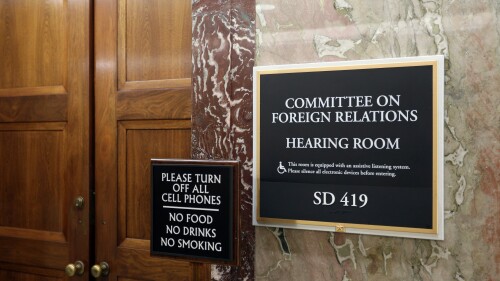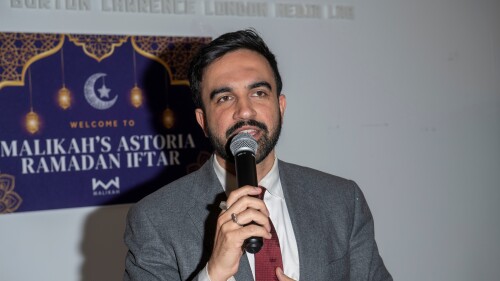When it comes to the Arab-Israeli conflict, there is no space for opposing viewpoints at the upcoming conference organized by the Islamic Society of North America (ISNA), the largest Muslim advocacy group operating in the United States. While claiming to “foster the development of … interfaith relations,” ISNA also supports the Boycott, Divestment and Sanctions (BDS) movement, which seeks to isolate Israel completely and sever all diplomatic ties until certain maximalist demands are met.
Perhaps, then, the playwright, attorney and polemicist Wajahat Ali should have anticipated the letter he received from ISNA Vice President Altaf Husain formally revoking his invitation to speak at the group’s 55th annual convention. What unforgivable sacrilege did Ali commit to precipitate his ISNA excommunication
The Islamist powers-that-be were outraged with Ali’s participation in the Shalom Hartman Institute’s Muslim Leadership Initiative, a program that “invites North American Muslims to explore how Jews understand Judaism, Israel and Jewish peoplehood,” but which American Islamist operatives claim is a scheme to make American Muslims appear “more ambiguous, and more sympathetic, towards Zionism.”
As part of the Muslim Leadership Initiative, which “seeks to expand participants’ critical understanding of the complex religious, political and socioeconomic issues facing people in Israel and Palestine,” Ali journeyed to Israel and the West Bank to speak with Jewish settlers. He then recounted his experiences—and his unsparingly critical observations of his hosts—for The Atlantic in a June article titled “A Muslim Among Israeli Settlers.”
It was this particular piece of writing that Ali claimed led to his expulsion. In a follow-up piece for the same publication, Ali questioned his revoked speaking privileges, explaining that, “I am neither a Zionist nor a supporter of Israel’s occupation.” Indeed, it didn’t seem to matter to ISNA that Ali’s account portrayed Israeli settlers as a deeply prejudiced and superstitious people who were afraid of the “brown-skinned, practicing Muslim from the United States.”
Other ISNA supporters touted different reasons for the ban. One supporter told Ali that the “disdain towards you is because you chose to engage with a Zionist group about Israel/Palestine when there were many other groups you could have engaged with to learn in a more nuanced manner. You then magically gained access to The Atlantic [a publication run by a former IDF prison guard] and similar forums to write about said topic.”
Meanwhile, in his letter to Ali, ISNA President Altaf Husain did not offer any concrete reasons at all for the expulsion, merely stating: “Other than our creed as Muslims, there is perhaps nothing more exemplary and unifying than our community’s support for the Palestinian people of all faith traditions, in their struggle against occupation and dispossession.”
One thing seems clear: Ali crossed a red line by seeking to exit the Islamist echo chamber for a first-hand account of the Israeli perspective. He “engaged” with the wrong sort of Jews.
Islamist Society of North America
ISNA has a history of extremist links. In 2008, it was designated by federal prosecutors as an unindicted co-conspirator during the terrorism financing trial of the Holy Land Foundation, an Islamic charity that funded the designated terror group Hamas. A federal judge found there was “ample evidence” establishing ISNA’s ties with Hamas, a U.S.-designated terrorist entity since 1997.
Today, while ISNA feels unable to associate with anyone who dares to humanize Israelis, ISNA officials are perfectly content to consort with some of the most extreme voices in American Muslim communities. ISNA conventions, regularly lauded as the largest annual gathering of American Muslims, have developed a reputation for serving as a platform for anti-Semitic, homophobic and misogynistic rhetoric from speakers, some of are often unabashedly sympathetic to violent terrorist organizations around the world.
While Ali was outcasted from this year’s convention, ISNA organizers had no moral objection to offering the podium to Dr. Yasir Qadhi, imam of the Memphis Islamic Center and the dean of Academic Affairs at the fundamentalist Al-Maghrib Institute. Qadhi has become somewhat of a fixture on ISNA panels, despite previously deriding Christians and Jews as a “filthy, dirty, [and] impure,” and suggesting that the Holocaust was a deliberateJewish conspiracy advanced to promote the Zionist agenda.
In one particularly nauseating sermon, Qadhi asserted that “to stone the adulterer” and “to kill, by the way, the homosexual” is “part of our religion,” although he cautioned: “This doesn’t mean we go and do this in the America … but I’m saying if we had an Islamic state we would do this.”
It’s not just ISNA’s choice of speakers that is of concern. Year after year, ISNA co-founder and former president Dr. Muzammil Siddiqi has been invited to ISNA functions. where he has promoted Sharia law as a viable replacement to modern secular democracy. In 2008, the Muslim jurist told the audience at a local ISNA conference that the laws prescribed in the Koran took precedent over the temporal “law of the land.”
And in an interview previously published on ISNA’s website, Siddiqi condemned the LGBT community: “Homosexuality is a moral disorder. It is a moral disease, a sin and corruption … which must be “checked and corrected.” Siddiqi even expressed support for laws in countries where homosexuality is punishable by death.
Ulterior motives
ISNA’s decision to blacklist Ali may have been a response to previous demands made byDr. Tariq Ramadan, the Swiss-born Islamic scholar and grandson of the late Egyptian Muslim Brotherhood founder Hasan Al-Banna. Ramadanboycotted the 2014 and 2015 ISNA conventions, complaining that the group’s leadership was “too often silent, as if paralyzed by fear” to condemn the Obama administration’ssupport for Israel’s right to self-defense. Ramadan was ultimately rewarded for his stance, returning to the annual ISNA convention as an event headliner in 2016. (Ramadan isn’t likely to be spotted at this year’s conference, however; he currently languishes in a French jail cellawaiting trial after four different women accused him of rape.)
ISNA may even object to the Shalom Hartman Institute’s MLI program out of deference to Turkish President Recep Tayyip Erdoğan. Under this Islamist dictator, Turkey has become a home for the Muslim Brotherhood and senior Hamas operatives. Accordingly, Ankara has become the natural ally of Islamist affiliates in the United States, such as ISNA.
This might explain why Erdoğan’s senior adviser, Ibrahim Kalin, and two other pro-regime speakers were invited to extol the virtues of the former Islamic Caliphate at ISNA’s 2014 convention in a speaker series titled “Turkey at a Crossroads.”
Even more interestingly, Ali’s interfaith activities perhaps threatened to undermine ISNA-Turkish relations on another issue. MLI is the brainchild of Imam Abdullah Antepli, a chaplain at Duke University who also happens to be a follower of the self-exiled cleric Fethullah Gülen. Erdoğan publicly blames Gülen—and his international network of supporters and institutions—for a failed coup attempt in 2016. Erdoğan would be none too pleased to discover that his new friends in America were consorting with his old enemies at home.
Despite claiming “to be an exemplary and unifying Islamic organization,” ISNA had no qualms about becoming embroiled in Turkey’s domestic politics when members invited Deputy Prime Minister Numan Kurtulmuş and a Turkish delegation to its 53rd annual convention in 2016. Kurtulmuş wasted no time denouncing millions of worldwide Gülenists and calling them “no different from the PKK or DAESH terror groups,” a reference to militant Kurdish separatists and the Islamic State.
Interfaithless
ISNA does engage in some interfaith dialogue activities, but only if it serves the Islamist agenda.
Moderate Muslims have tried to warn Jewish leaders. In a 2008letter addressed to Rabbi Eric H. Yoffie, nine reformist Muslims criticized an interfaith alliance between the Union for Reform Judaism (URJ) and ISNA, warning that the Islamist group is “fundamentally hostile to Jews and suppresses the intellectual and social development of Muslims.” The signatories urged URJ to be wary of radicals “camouflaged as moderates,” and insisted that ISNA was not the appropriate partner “to further interfaith civility and cooperation.”
Ali’s 11th-hour expulsion is just the latest in a long list of ISNA’s interfaith-related follies. In 2016, ISNA came to regret announcing a public partnership with the American Jewish Committee (AJC), with which it formed the Muslim-Jewish Advisory Council. ISNA issued an embarrassing “clarification” denying official involvement, and explaining that “standard reporting and approval mechanisms were not followed to secure formal approval” for the faith-based alliance. ISNA claimed it had been “inundated with inquiries” from its constituents demanding that they sever ties with the Zionist institution.
Then, subsequently, one of the ISNA-backed imams appointed to the Muslim-Jewish Advisory Council, Imam Shamsi Ali, was quietly removed from his position after it emerged his Indonesian-language social-media posts were a lot less moderate than his English sermons. It emerged that Shamsi Ali had conveyed his “respect for the fighting spirit of Hamas,” a Palestinian terrorist group bent on the complete destruction of Israel, while writing that “Jews are working to destroy Islam and the Ummah[the worldwide Muslim community].” (It appears, meanwhile, that Shamsi Ali’s effusive contempt for Jews and homosexuals has not excluded him from being a 2018 ISNA convention speaker.)
Wajahat Ali should have been prepared for the discriminatory backlash that followed his decision to speak with Israeli Jews—for he should have known that ISNA was not an authentic platform for interreligious engagement or honest discussion. As part of the BDS movement, ISNA seeks to impose embargoes on Israel, transcending purely commercial sanctions in favor of a wholly uncompromising, rejectionist path to interfacing with Israel.
Ultimately, Ali was offered a pungent taste of what it is like to be on the receiving end of the BDS movement, punished by his Islamist peers for failing sufficiently to hate the Zionist boogeyman.
Benjamin Baird is a writer for Islamist Watch, a project of the Middle East Forum.








